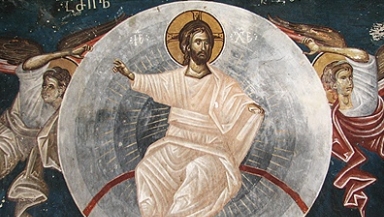
Today is Ascension Day, when the Church commemorates the ascension of Jesus into heaven.
The story is told in Luke 24:50-53 and in a much-expanded version, also by Luke in Acts 1:6-11. It's also in the longer ending of Mark's Gospel (16:19), which scholars don't think is part of the original. Matthew and John don't mention it, but Matthew has a "farewell" mountaintop scene in which Jesus commands his disciples to "go and make disciples of all nations".
The Ascension is a difficult thing to visualise. Taken literally, it implies a "three-decker" universe in which heaven is "up" and hell is "down", with earth in between. However this works as a spiritual concept, it has no basis in physical fact. So some scholars regard the stories of the Ascension as Luke's way of dramatising a spiritual reality: that Jesus has completed his work and returned to his heavenly position at the right hand of the Father. Others say the disciples were given a vision of "Ascension" which was appropriate to their understanding.
But whatever the truth of their experience, we shouldn't let these questions get in the way of understanding what Ascension means for us. Here are three things that can help us in our discipleship.
1. The Ascension is a picture of triumph. The Gospels portray Jesus as a man, and at the end of his life as an abused and crucified man, broken and humiliated. But the Ascension portrays him as a victorious warrior returning to his kingdom. It's like a Roman victory parade. The image of Christ on the cross is a precious one for Christians. But it is not the whole picture: Christ overcame every enemy and so there is nothing we need to fear.
2. The Ascension completes Christ's work. Philippians 2:7 tells us that he "made himself nothing, taking the very nature of a servant, being made in human likeness". At the incarnation, Christ put off the trappings of divinity. At the Ascension he resumed them. Luke's story is a way of presenting a profound theological truth which the other Gospels leave hanging: that Christ's work was completed when he ascended into heaven.
3. The Ascension was necessary for the Church. Luke tells us in Acts 1 that Jesus promised to send them the Holy Spirit. In his earthly incarnation he was known only to a few thousand people. Through the Spirit, he is known to millions. In this sense, the Ascension is a necessary preliminary to Pentecost.
If we shy away from the Ascension because it's hard to imagine it, we're missing Luke's point. It's not about tidying up loose ends or even necessarily giving us a factual record of an actual event. Luke is inviting us to think about what it means to say that Jesus is in heaven. As the writer of the letter to the Hebrews says, we have "a high priest, who sat down at the right hand of the throne of the Majesty in heaven, and who serves in the sanctuary, the true tabernacle set up by the Lord, not by a mere human being". Jesus ascended to heaven and he represents us to the Father.
Follow Mark Woods on Twitter: @RevMarkWoods

















